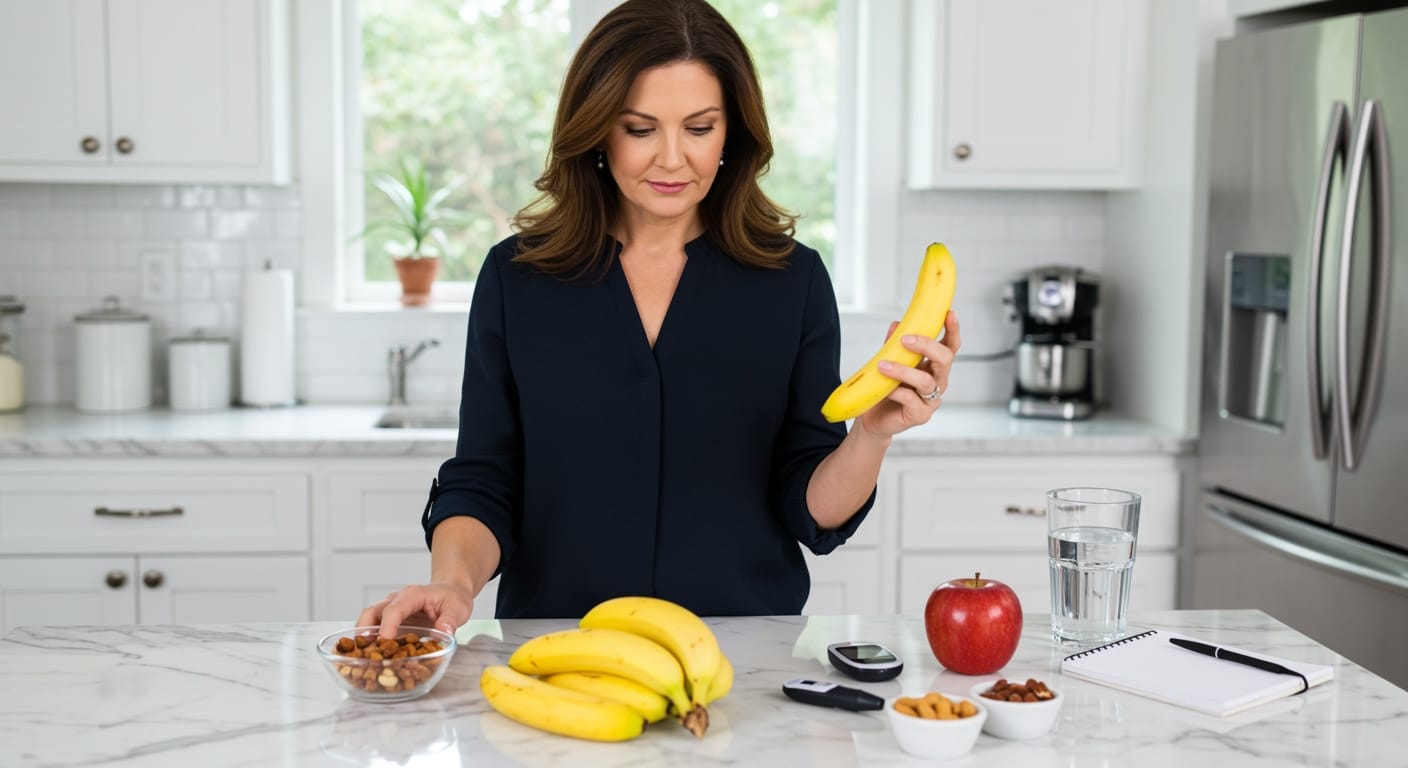✪ Key Takeaway: Diabetics can eat bananas in moderation, but ripeness and portion size matter more than you think for blood sugar control.
Introduction
You walk down the grocery store aisle and see those bright yellow bananas calling your name.
But then you remember your diabetes diagnosis and wonder if this sweet fruit will send your blood sugar through the roof.
Hi, I’m Abdur, your nutrition coach and today I’m going to explain exactly how bananas affect blood sugar and whether you can safely include them in your diabetes meal plan.
How Much Sugar Do Bananas Actually Contain?
A medium banana contains about 14 grams of sugar and 27 grams of total carbohydrates.
This might sound high, but the story gets more interesting when you look at the glycemic index.
Bananas have a glycemic index of 51, which puts them in the moderate range rather than high.
The fiber content in bananas helps slow down sugar absorption into your bloodstream.
One medium banana provides about 3 grams of fiber, which acts like a natural brake on blood sugar spikes.
Compare this to a can of soda with 39 grams of sugar and zero fiber, and you start to see why bananas are not the villain they seem.
✪ Fact: Green bananas contain more resistant starch, which acts like fiber and causes less blood sugar impact than yellow bananas.
Does Banana Ripeness Change Blood Sugar Impact?
The ripeness of your banana makes a huge difference in how it affects your blood sugar.
Green bananas contain more resistant starch, which your body cannot digest quickly.
As bananas ripen and turn yellow, the starch converts to simple sugars that absorb faster.
Overripe bananas with brown spots contain the most sugar and will cause the biggest blood sugar spike.
Research shows that green bananas have a glycemic index of around 30, while overripe bananas can reach 62.
This means choosing a slightly green or just-yellow banana gives you better blood sugar control than waiting for it to get sweet and spotty.
✪ Pro Tip: Store bananas in the refrigerator once they reach your preferred ripeness to slow down further sugar development.
What About Portion Size and Timing?
Portion control becomes your best friend when eating bananas with diabetes.
A small banana (6 inches long) contains about 19 grams of carbs, while a large one (8-9 inches) packs 31 grams.
Most diabetes educators recommend counting one small banana as one carb serving for meal planning.
The timing of when you eat your banana matters too.
Eating a banana alone on an empty stomach will cause a faster blood sugar rise than pairing it with protein or healthy fats.
Try combining half a banana with a tablespoon of almond butter or a handful of nuts to slow sugar absorption.
Post-workout timing can also work in your favor since your muscles will use that banana sugar for recovery rather than spiking your blood glucose.
✪ Note: Always test your blood sugar 2 hours after eating a banana to see how your body personally responds.
Are There Better Fruit Options for Diabetics?
While bananas can fit into a diabetic diet, some fruits offer better blood sugar control.
Berries like strawberries, blueberries, and raspberries contain less sugar and more fiber per serving.
Apples with the skin on provide similar fiber benefits to bananas but with a lower glycemic impact.
Citrus fruits like oranges and grapefruits offer vitamin C and fiber while keeping blood sugar more stable.
However, this does not mean you must avoid bananas completely.
Bananas provide potassium, vitamin B6, and vitamin C that your body needs for optimal health.
The key is variety and moderation rather than elimination.
✪ Pro Tip: Rotate between different fruits throughout the week to get varied nutrients while keeping your taste buds interested.
The Bottom Line
Bananas are not off-limits for diabetics, but they require smart choices about ripeness, portion size, and timing.
The best nutrition advice is the one you can actually follow long-term without feeling deprived.
I would love to hear about your experience with bananas and blood sugar in the comments below, or if you have any questions about managing diabetes through nutrition.
References
At NutritionCrown, we use quality and credible sources to ensure our content is accurate and trustworthy. Below are the sources referenced in creating this article:
- Glycemic Index Net: Banana Glycemic Index
- Nutrisense: Bananas and Blood Sugar
- Signos: Glycemic Index of Banana
- Healthline: Bananas and Diabetes






Newly diagnosed with Type 2 diabetes here. I ate a nine-inch, overripe banana on an empty stomach, hoping for an energy boost before a ninety-minute intense weightlifting session. My blood glucose reading on a continuous glucose monitor went from seventy-eight to one hundred and forty-nine in thirty minutes. It dropped back to ninety-two in one hundred and twenty minutes, but I did not feel any energy boost to speak of.
Hello Steve and thank you for sharing your experience. So many people deal with the exact same issue every day. It is common to feel frustrated when a so called healthy food gives you unexpected results.
You are seeing firsthand how food ripeness can affect your blood sugar. That overripe banana contained a lot of simple sugars that your body absorbed quickly on an empty stomach. This article explains how the resistant starch in green bananas converts to simple sugar as the banana ripens.
The good news is you can still eat bananas. Try eating a smaller, slightly green banana with a spoonful of peanut butter before your workout. The protein and healthy fat in the peanut butter will slow down sugar absorption and prevent a sudden blood sugar spike. Always prioritize your health over convenience.